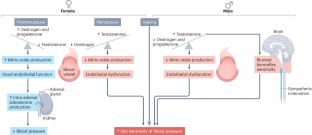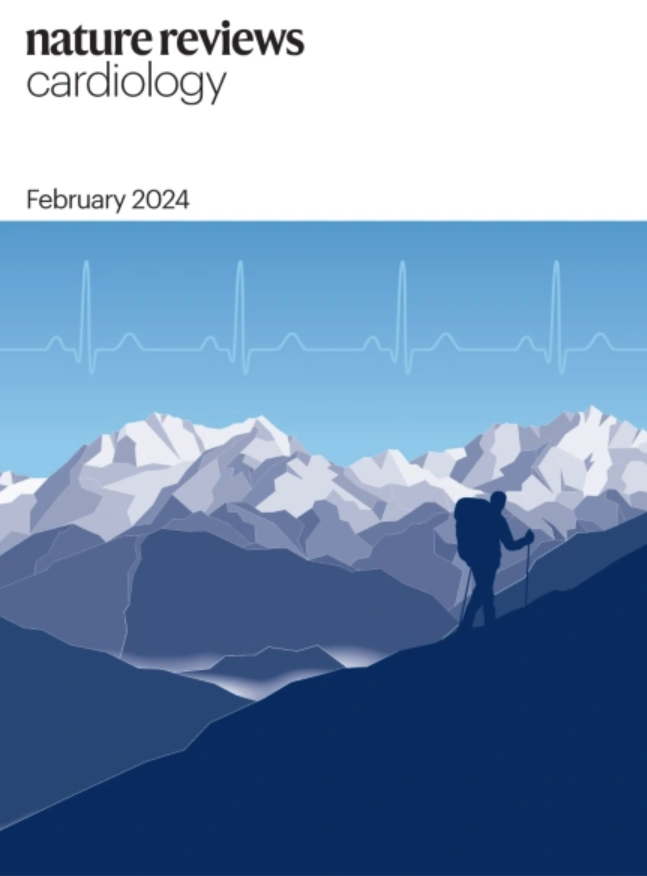Salt sensitivity of blood pressure: mechanisms and sex-specific differences
IF 44.2
1区 医学
Q1 CARDIAC & CARDIOVASCULAR SYSTEMS
引用次数: 0
Abstract
Salt sensitivity of blood pressure (SSBP) is an independent risk factor for cardiovascular disease in individuals with or without hypertension. However, the mechanisms and management of SSBP remain unclear, mainly because the diagnosis of this condition relies on salt loading–depletion protocols that are not feasible in the clinic. The prevalence of hypertension is lower in premenopausal women than in men, but this sex-specific difference is reversed after menopause. Whether excessive SSBP in women at any age contributes to this reversal is unknown, but many clinical studies that have rigorously assessed for SSBP using salt loading–depletion protocols have confirmed that SSBP is more prevalent in women than in men, including during premenopausal age. In this Review, we discuss sex-specific mechanisms of SSBP. We describe sex-related differences in renal transporters, hypertensive pregnancy, SSBP in autoimmune disorders and mitogen-activated protein kinase signalling pathways, and highlight limitations and lessons learned from Dahl salt-sensitive rat models. In this Review, Kirabo and colleagues discuss the mechanisms that underlie the sex-related differences in salt sensitivity of blood pressure and hypertension, highlighting the implications for research and clinical practice.


血压的盐敏感性:机制和性别特异性差异
血压盐敏感性(SSBP)是高血压患者或非高血压患者心血管疾病的独立危险因素。然而,SSBP的机制和治疗仍不清楚,主要是因为这种疾病的诊断依赖于临床不可行的盐负荷消耗方案。绝经前女性的高血压患病率低于男性,但这种性别差异在绝经后被逆转。任何年龄的女性是否有过量的SSBP导致这种逆转尚不清楚,但许多使用盐负荷耗尽方案严格评估SSBP的临床研究证实,女性比男性更普遍,包括绝经前年龄。在这篇综述中,我们讨论了SSBP的性别特异性机制。我们描述了肾转运蛋白、高血压妊娠、自身免疫性疾病中的SSBP和丝裂原激活的蛋白激酶信号通路的性别相关差异,并强调了Dahl盐敏感大鼠模型的局限性和经验教训。
本文章由计算机程序翻译,如有差异,请以英文原文为准。
求助全文
约1分钟内获得全文
求助全文
来源期刊

Nature Reviews Cardiology
医学-心血管系统
CiteScore
53.10
自引率
0.60%
发文量
143
审稿时长
6-12 weeks
期刊介绍:
Nature Reviews Cardiology aims to be the go-to source for reviews and commentaries in the scientific and clinical communities it serves. Focused on providing authoritative and accessible articles enriched with clear figures and tables, the journal strives to offer unparalleled service to authors, referees, and readers, maximizing the usefulness and impact of each publication. It covers a broad range of content types, including Research Highlights, Comments, News & Views, Reviews, Consensus Statements, and Perspectives, catering to practising cardiologists and cardiovascular research scientists. Authored by renowned clinicians, academics, and researchers, the content targets readers in the biological and medical sciences, ensuring accessibility across various disciplines. In-depth Reviews offer up-to-date information, while Consensus Statements provide evidence-based recommendations. Perspectives and News & Views present topical discussions and opinions, and the Research Highlights section filters primary research from cardiovascular and general medical journals. As part of the Nature Reviews portfolio, Nature Reviews Cardiology maintains high standards and a wide reach.
 求助内容:
求助内容: 应助结果提醒方式:
应助结果提醒方式:


